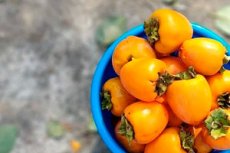New publications
Persimmons have antiviral properties
Last reviewed: 02.07.2025

All iLive content is medically reviewed or fact checked to ensure as much factual accuracy as possible.
We have strict sourcing guidelines and only link to reputable media sites, academic research institutions and, whenever possible, medically peer reviewed studies. Note that the numbers in parentheses ([1], [2], etc.) are clickable links to these studies.
If you feel that any of our content is inaccurate, out-of-date, or otherwise questionable, please select it and press Ctrl + Enter.

Scientists have proven that the constituent components of persimmon fruits are capable of preventing the spread of viral infections – and in particular, the COVID-19 virus.
A variety of remedies, including folk remedies, are used as treatments for viral diseases. At the same time, science does not stand still: scientists continue to search for new and new ways to treat and prevent viral infections. In addition to treating an existing disease, it is equally important to prevent the spread of infection from an infected and sick person to healthy people in advance.
Researchers from Japan, representing Nara Women's University, have discovered a way to slow down the transmission of a viral pathogen between people using natural substances. Such substances are called tannins and are present, in particular, in the well-known fruit - persimmon. Scientists conducted an experiment for which they chose the most relevant virus today - COVID-19.
Tannins are substances that cause the feeling of astringency in the mouth, which is very characteristic of persimmon.
The scientists' study consisted of the following. They isolated a number of astringent components from persimmon pulp, including tannins. The resulting substances were combined with the saliva of a coronavirus patient. As a result, it was discovered that after just 10 minutes, the astringent components reduced the contagiousness of the virus, and the risk of transmitting the infection to another person decreased ten thousand times.
At the same time, the researchers emphasize that eating persimmons and other products with a high tannin content cannot guarantee 100% protection against infection. Moreover, it is important to continue conducting trials involving a larger number of participants with different viral diseases.
Scientists are doing everything possible to create a drug as quickly as possible that would be able to deactivate coronavirus and other similar infections. It is quite possible that such a remedy will be based on astringent components. It is very important to prevent the spread of diseases in the cold season - in autumn, winter and early spring, when the human body is especially susceptible to infection, and the immune defense is significantly weakened by external factors.
By the way, in addition to persimmon, tannins are present in sufficient quantities in eucalyptus leaves and tea, in pomegranate peel, in blueberries, blackberries and cranberries, as well as in rhubarb and pumpkin, red and white wine. In addition to the antiviral effect, tannins help remove toxins and heavy metal salts from the circulatory system, strengthen vascular walls and improve the absorption of ascorbic acid by the body.
More details about the news can be found on the mainichi website page
